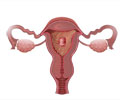
‘Advanced maternal age of 40 or over is associated with preterm birth.’
Tweet it Now
Fuchs and colleagues sought to investigate the impact of maternal age on preterm birth in a large cohort. The researchers analyzed the previously-collected data from the QUARISMA randomized controlled trial, which had taken place in 32 hospitals in Quebec, Canada, from 2008 to 2011. The researchers identified five different age groups among the 165,282 pregnancies included in the study and compared them based on maternal characteristics, gestational and obstetric complications, and risk factors for prematurity. Some of the known risk factors identified more commonly in older mothers (40 and over) included placental praevia, gestational diabetes, medical history, use of assisted reproduction technologies and occurrence of an invasive procedure. On the other hand, nulliparity, past drug use, and smoking were more prevalent in younger mothers (30 and under).
Even after adjusting for confounding factors, the researchers found that advanced maternal age (40 or over) was associated with preterm birth. Meanwhile, a maternal age of 30-34 years was associated with the lowest risk of prematurity.
Source-Eurekalert















